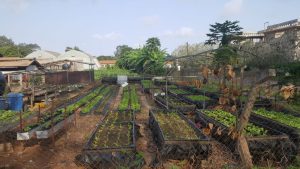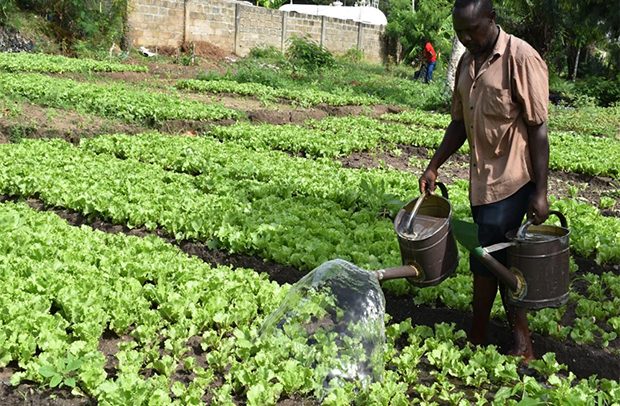A vegetable farm
Image courtesy Dr. Yaw Agyeman Boafo
Ghana’s climate is tropical and strongly influenced by the West Africa Monsoon Winds. The climate is generally warm with variable temperatures masked by seasons and elevation. The northern part of the country typically records one rainy season, which begins in May and lasts until September. Southern Ghana records two rainy seasons; major season from April to July and minor from September to November.
History of vegetable farming in Accra
Though urban farming was not common in the 1970s, it started when the General Kutu Acheampong’s administration (please insert year) launched a programme called ‘Operation Feed Yourself’ to encourage the urban population to practise backyard farming in their homes. This was aimed at reducing the economic challenges facing Ghanaians at the time.
Though the programme is no more in operation, it left a lot of Ghanaians farming especially migrants from the rural areas who had no particular skills and so, were unable to secure formal employment in Accra. They therefore had to go into vegetable farming to be able to make a living.
These urban vegetable farmers located along the Tema Motorway, Kwabenya near Atomic Energy, Dzorwulu, Shiashie, Korle-Bu, Roman Ridge and Ashaiman, among others, mostly grow lettuce, cucumber, cabbage, carrots, cauliflower, green pepper and spinach.
According to the farmers, most of them irrigate their farmlands from streams and boreholes nearby over the years in addition to relying on nature for rains during the rainy season.
They, however, bemoaned how the situation has changed as they are unable to get enough water using the irrigation method while the rains are also unpredictable for them to plan with, in the last ten years, resulting in low productivity.
Experiences of some urban vegetable farmers
Yusif Musah, a vegetable farmer on the Accra Tema Motorway, in an interview noted, “I used to have about three labourers who assisted me to work on about 200 beds of lettuce when I started farming here 15 years ago, but I had to let them stop because I could not make enough money to be able to pay these hired men. Ten years ago, though the weather conditions were relatively predictable, it was better than today. I can barely produce enough to sell to be able to buy fertilizer and other inputs. I cannot afford to buy water all the time. The rains could have helped if they fall at the time we need.”
Kwamena Mensah is a 41-year-old farmer who grows onions, pepper, cabbage and carrots at Kwabenya in Accra, also stated, “I used to work here as a student when my father was alive, we could easily predict the rainfall pattern and tell easily the dry season as well as the rainy season. The rainy season sometimes starts earlier than expected, stops early or lasts very long in a particular year while in another year, it may not start early or there could be prolonged heavy rainfall which sometimes destroys our crops. Last year, for instance, out of about 200 beds of cabbage I cultivated, I was only able to harvest less than half of that because some rains that fell continuously on one of the days destroyed the crop.
Research
A study by Prof. Felix Asante and Franklin Amuakwa- Mensah of the Institute of Statistical Social and Economic Research, (ISSER), reveal that though Africa is the least contributor of climate change among the continents, Africa is more vulnerable to the effects of climate change due to its overdependence on rain-fed agriculture.
Ampadue, in a study in 2019, said “rainfall has become more variable compared to the early 1970’s and 80’s. It is a threat to the livelihood of most farmers in Ghana”.
Views from some experts
Speaking in an interview with the DAILY GUIDE, Senior Research Fellow with the Centre for Climate Change and Sustainability Studies, University of Ghana, Dr. Yaw Agyeman Boafo, said the global ecosystem is influenced by climatic conditions by temperature, precipitation, wind and humidity.
According to him, these forces are also influenced by the ocean, forest and atmosphere which provides the climatic condition that exist as a mix of these forces influences climate change
Human beings started using different kinds of mechanization to manufacture things during the industrial revolution producing additional gases to greenhouse gases, carbon, oxygen and methane which are already in the atmosphere.
He also explained that these artificial gases produced through human activities have added to the natural gases that regulate the climate in the world which have therefore accelerated a change in the natural climatic conditions of the world.
“Climate change according to fossil records has happened many years ago especially in terms changes in vegetation in the world which led to a change in certain climatic conditions but this time around, its human beings who are driving the change because of the energy we use such as flight transport, electricity, among others. Everything that we do is adding oxygen, methane, carbon, etc. going into the atmosphere,” he noted.
Dr. Boafo, who is also a Senior Research Fellow with Integrated Ecosystems Assessment & Sustainability Science, further stated that these developments have therefore caused a drastic change in the natural order of things which is manifested in changes in rainfall pattern, changes in temperature, extreme heat among others.
He said rainfall has therefore become more variable where data suggests that over the years, temperatures continue to increase globally though some areas in Ghana have high rainfall because those are forest areas.
According to him, though all countries across the globe have experienced some form of climatic changes, the impact on farmers may be high if they fail to adopt innovative and modern agricultural practices.
Some of these methods include the use of purified water to irrigate their crops, and applying irrigation systems that will have all year round water.
He also recommended that Institutions and relevant agencies such as water and sewerage could work together to design a clear structured policy on urban agriculture, to help provide the necessary infrastructure to help urban vegetable farmers to continue to add to the urban food systems.
He also suggested the use of alternative greenhouse farming which is practiced in more advanced where crops are grown in a controlled environment.
A former Director of the Centre for Climate Change and Sustainable studies, University of Ghana, and senior lecturer of at the Dept. of Geography and Resource Development, Prof. Kwadwo Owusu, for his part, also buttressed the need for the urban vegetable farmers to innovate to improve productivity as the climate has never been static.
He said though it requires some interventions from the state for these farmers to be retooled from the Assemblies where they farm, they could also put themselves into groups and find innovative ways of improving productivity, in order not to be impacted heavily by changes in rainfall pattern which was easier to predict in the past.
Government/state interventions
The former Minister of food and agriculture, Dr, Owusu Afriyie Akoto, has disclosed that a number of interventions have been set up to assist vegetable farmers.
These, he said, include the peri-urban vegetable value chain project by the Ministry of Food and Agriculture aimed at prioritizing vegetable production.
He said it was also supported by the establishment of three greenhouse gases technology villages at Dahwenya in the Greater Accra Region; Bodwiase in the Central Region; and Akomadan in the Ashanti Region; in addition to training on other basic farm management practices.

This report is produced in fulfilment of UNESCO and CIJ London Climate Change in News media project facilitated by the Centre for Journalism Innovation and Development (CJID)
By Ebenezer K. Amponsah

